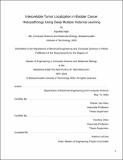Interpretable Tumor Localization in Bladder Cancer Histopathology Using Deep Multiple Instance Learning
Author(s)
Nair, Karthik
DownloadThesis PDF (28.40Mb)
Advisor
Van Allen, Eliezer
Uhler, Caroline
Terms of use
Metadata
Show full item recordAbstract
Deep learning has emerged in cancer histopathology as a tool for predicting clinical and molecular properties of a patient’s disease, thereby connecting slide with function. This concept is especially relevant to bladder cancer, where molecular and histopathologic heterogeneity is known to impact oncogenesis and disease progression, though the underlying properties governing these features are incompletely known. Traditional tile-based deep learning approaches to analyze bladder cancer (and other cancer) histopathology images do not integrate information across whole slides, potentially forfeiting accuracy and interpretability on more complex pathology tasks that require global slide context beyond local morphology, such as tumor subtyping and mutation prediction. To this end, we compare CLAM, a recently developed multiple instance learning model designed to address these limitations, to a tile-based computer vision model on over 1,500 hematoxylin and eosin (H&E)-stained bladder cancer (urothelial carcinoma) slides. We found that CLAM was more robust against overfitting to spurious confounders when compared with a traditional approach, resulting in more interpretable outputs. Additionally, we generated high-resolution tumor localization maps for a previously unstudied cohort using CLAM. Taken together, our results demonstrate CLAM to be a promising approach for tackling difficult digital pathology tasks previously hindered by traditional approaches.
Date issued
2022-05Department
Massachusetts Institute of Technology. Department of Electrical Engineering and Computer SciencePublisher
Massachusetts Institute of Technology